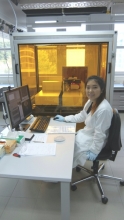
University:
Major:
Site Abroad:
Mentor(s):
Faculty Sponsor(s):
Project Title:
Project Description:
Various biological creatures, such as geckos and beetles, have become subjects of interest for their exceptional adhesion. Octopuses have been studied extensively, from their muscle structure to morphology, for their ability to stay adhered on smooth and even rough surfaces for an elongated time. In this project, we work to study the effect of suction cups in the microscopic scale and determine the optimal geometry for maximum adhesion.
Using simplified models of the Octopus Vulgaris suckers, we were able to correlate the change in volume, pressure, and suction force. Suction cups varied in diameter, thickness, and angle of curvature, with each array having an equal amount of free volume which allowed for direct comparison of results. Micro-suction cups were fabricated onto glass substrates using two-photon lithography that, in turn, were replicated with various poly(ethylene glycol) dimethacrylates (PEGdma) materials. By changing the molecular weights of the pre-polymer solutions and therefore the cross-linking density, the mechanical characteristics of the final polymeric suction cups were varied.
Adhesion was first tested on suction cups of diameter 5µm, thickness 1µm, and angles 90º, 120º, and 180º. Results showed higher free volume leading to higher adhesion. Cycle test revealed that structures are not damaged during adhesion, and the suction cups are easily detached from the probe, indicating repeatability. In the future, more complicated structures in other materials will be tested, both under vacuum and in ambient air to properly distinguish the suction effect from normal adhesion of the contact area.
